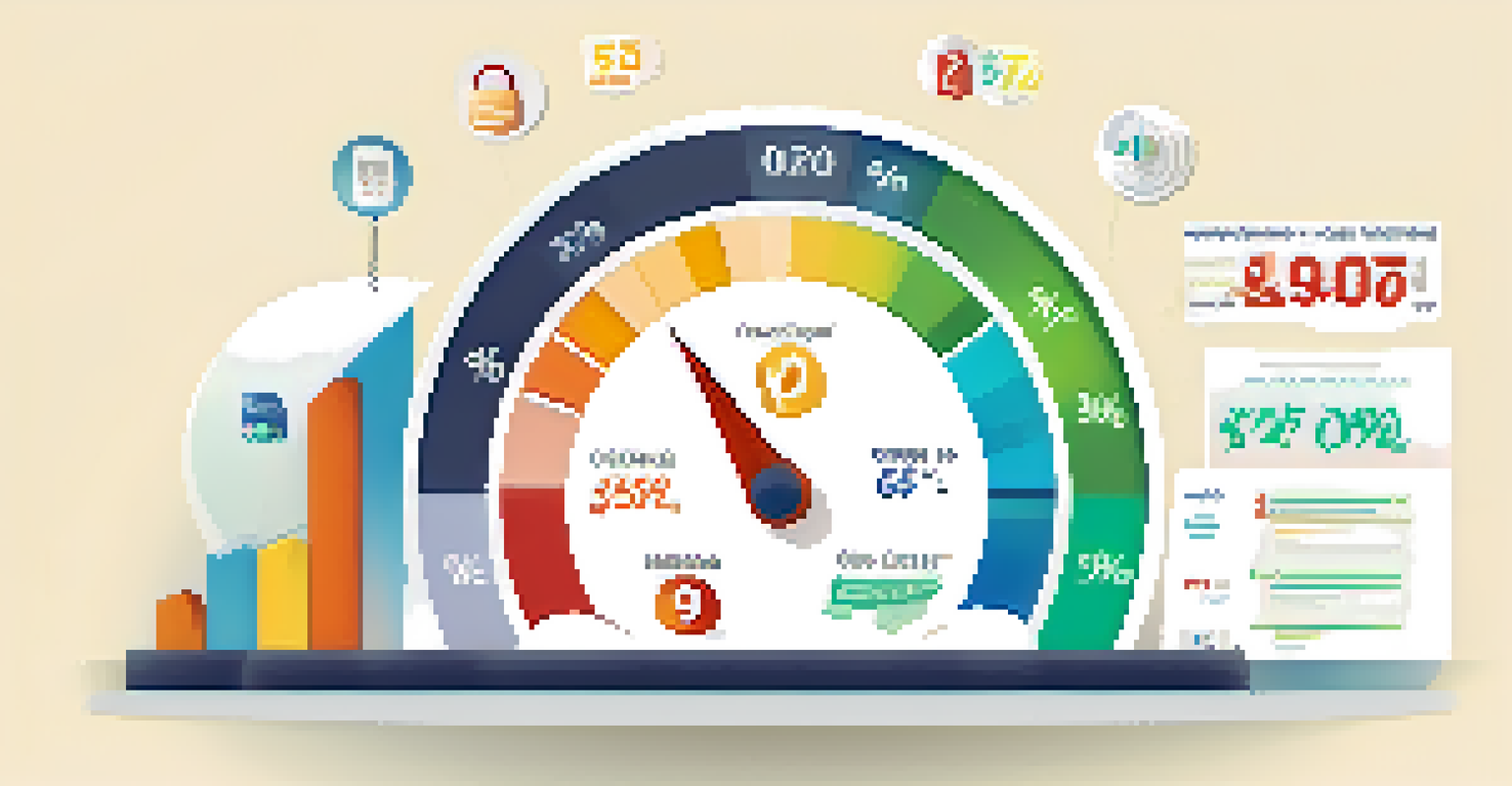Evaluating Investment Risks Through Credit Score Analysis

Understanding Credit Scores and Their Importance
Credit scores are numerical representations of an individual's creditworthiness. Ranging from 300 to 850, these scores reflect a person's credit history, including payment history, credit utilization, and types of credit used. For investors, understanding the nuances of credit scores is crucial, as they provide insights into potential risks associated with lending or investing.
Your credit score is a reflection of your financial habits, and it can affect your financial future in ways you might not expect.
For example, a high credit score often indicates responsible borrowing behavior, suggesting that the individual is likely to repay loans on time. Conversely, a low credit score may raise red flags, prompting investors to consider the potential for default. By analyzing these scores, investors can make more informed decisions about where to allocate their resources.
Ultimately, recognizing the importance of credit scores in investment decisions can lead to better risk management strategies. Investors who grasp this concept are better equipped to navigate the complexities of financial markets while minimizing potential losses.
Key Components of a Credit Score Explained
Credit scores are calculated based on several key components, each influencing the overall score. The most significant factors include payment history, credit utilization ratio, length of credit history, types of credit accounts, and recent credit inquiries. Understanding these components can help investors assess the risk levels associated with different borrowers.

For instance, payment history—accounting for about 35% of the score—reflects whether an individual has paid their bills on time. A borrower with a solid payment history is typically seen as lower risk. On the other hand, high credit utilization, which measures how much of the available credit is being used, can indicate a riskier profile if it exceeds 30%.
Credit Scores Reflect Borrowing Risks
Credit scores serve as key indicators of an individual's creditworthiness, helping investors gauge potential risks in lending.
By breaking down these components, investors can pinpoint specific areas that may pose risks. This knowledge not only aids in evaluating individual borrowers but also helps in understanding broader market trends related to credit behavior.
The Role of Credit Scores in Investment Decisions
Investors often use credit scores as a primary tool for evaluating loan applications and potential investments. When assessing a borrower, a strong credit score can be a green light, while a weak score may signal caution. This process is particularly relevant in sectors like real estate and consumer lending, where creditworthiness directly impacts return on investment.
In investing, what is comfortable is rarely profitable.
For instance, a lender might be more inclined to approve a mortgage for a buyer with an excellent credit score, as this suggests a lower risk of default. In contrast, an investor might reconsider funding a startup if its founders have poor credit histories, signaling potential financial instability. The implications of these decisions can significantly affect the overall investment portfolio.
By incorporating credit score analysis into their decision-making processes, investors can enhance their risk assessment strategies. This proactive approach can lead to smarter investments and ultimately, greater financial success.
How Credit Scores Affect Interest Rates
One of the most immediate effects of credit scores on investment is their influence on interest rates. A higher credit score typically results in lower interest rates, while a lower score can lead to higher borrowing costs. This relationship is particularly important for investors seeking financing for their ventures or properties.
For example, a borrower with a credit score of 750 may secure a mortgage at 3%, while someone with a score of 600 might face rates upwards of 5%. These differences can drastically impact the profitability of an investment. Thus, understanding how credit scores correlate with interest rates can help investors make cost-effective financing decisions.
Interest Rates Linked to Credit Scores
Higher credit scores typically result in lower interest rates, which can significantly impact the profitability of investments.
Furthermore, investors should consider the long-term implications of interest rates influenced by credit scores. Higher costs can squeeze profit margins, so evaluating credit profiles before committing to investments is essential for maintaining financial health.
Mitigating Investment Risks Through Credit Score Monitoring
Regularly monitoring credit scores is a smart strategy for mitigating investment risks. Fluctuations in a borrower's credit score can indicate changes in their financial situation, which may impact their ability to repay loans. By keeping an eye on these scores, investors can act quickly to address potential issues before they escalate.
For instance, if a borrower’s score begins to decline, an investor might choose to restructure terms or demand additional collateral. This proactive approach can help safeguard investments and ensure that risks are managed effectively. Moreover, monitoring also applies to market trends, as widespread changes in credit behavior can signal shifts in economic conditions.
Incorporating credit score monitoring into an investment strategy not only enhances risk management but also fosters a more dynamic approach to investments. This practice can ultimately lead to improved financial outcomes and long-term success.
The Impact of Economic Conditions on Credit Scores
Economic conditions play a significant role in shaping credit scores and, by extension, investment risks. Factors such as unemployment rates, inflation, and overall economic growth can influence individual credit behavior, leading to fluctuations in scores. Investors should be aware of these broader economic indicators when evaluating potential risks.
For example, during economic downturns, higher unemployment may lead to increased defaults on loans, causing credit scores to drop. This scenario can create a ripple effect in the investment landscape, as lenders may tighten borrowing standards, impacting the availability of credit. Such conditions necessitate a careful reassessment of investment strategies.
Economic Conditions Affect Credit Scores
Fluctuations in economic conditions can influence credit behavior and scores, necessitating careful evaluation by investors.
Understanding the relationship between credit scores and economic conditions equips investors with the knowledge to adapt to changing landscapes. By remaining vigilant and informed, investors can navigate potential risks more effectively.
Building a Stronger Investment Portfolio with Credit Insights
Incorporating credit score analysis into investment strategies can significantly strengthen a portfolio. By understanding the creditworthiness of potential borrowers or investment opportunities, investors can make more informed choices that align with their risk tolerance. This insight can lead to a more robust and diversified investment strategy.
For instance, an investor might choose to focus on companies or individuals with strong credit scores, thereby reducing the likelihood of defaults. Additionally, leveraging credit data can help identify emerging opportunities within markets that may have been previously overlooked. By balancing risk and reward, investors can enhance their chances of success.

Ultimately, integrating credit insights into investment decisions fosters a more strategic approach. As investors become more adept at evaluating credit information, they are better positioned to navigate the complexities of financial markets and achieve their investment goals.